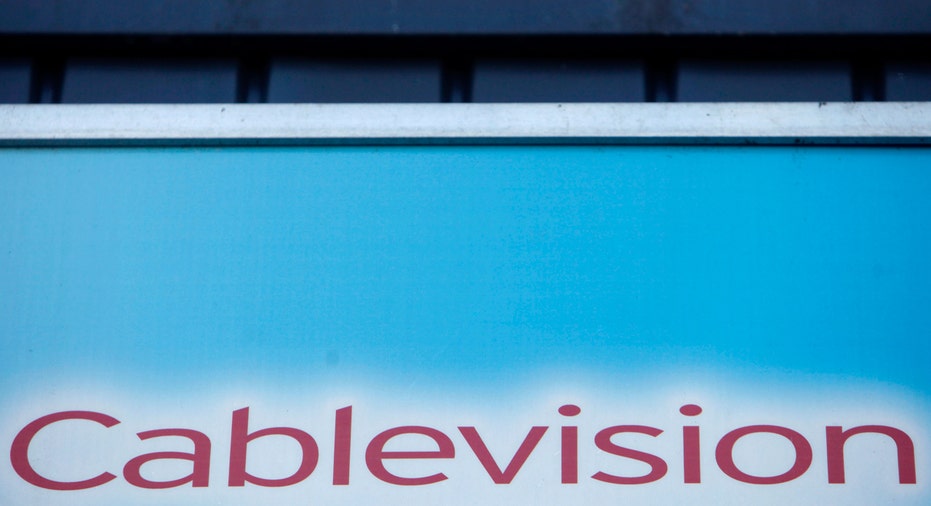Cable Deal Hits New Bumps

Altice's $10 billion deal to buy cable operator Cablevision Systems is running into unexpected turbulence in New York City. Since the European telecom operator announced the U.S. cable acquisition in September, Cablevision's shares have sunk further below Altice's all-cash offer of $34.90 a share. The stock is trading 9% below the agreed takeover price, reflecting investors' concerns about the deal closing. "The spread has widened in large part because people have become increasingly concerned that neither the city nor the state will find that the transaction is in the public interest, or alternatively, they'll demand so much in terms of givebacks that ultimately the deal won't be palatable to Altice," said Craig Moffett, analyst at MoffettNathanson LLC. New York City has said it has "a number of important concerns" about the merger and believes it has the power to deny the deal if it finds it isn't in the public interest. Cablevision's 3.1 million customers are concentrated in the greater New York market. In an interview, Mayor Bill de Blasio's top legal counsel Maya Wiley said the city is concerned about whether Altice has the financial wherewithal to digest Cablevision without skimping on customer service and infrastructure upgrades for faster Internet speeds. Ms. Wiley said the city is also concerned about the impact on jobs. Altice has a reputation for instituting drastic cost cuts. "Altice is talking about $900 million in synergies. Well, what's getting cut? How's that going to impact the economy of New York and quality of services?" Ms. Wiley asked. "We certainly are not afraid to disapprove a transaction." The scope of the city's authority is a point of contention. The companies are seeking approval from the Federal Communications Commission and New York's Public Service Commission, but told the city in a letter that their deal doesn't need its approval because Cablevision's "franchise" contract with the city exempts its cable services from review. They have filed for approval with the city, but only regarding Cablevision's business-telecom arm. New York City believes it has solid legal standing to review the deal, based on its interpretation of the franchise contract. The city is taking on a more expansive role than it did during Comcast's ill-fated attempt to buy Time Warner Cable. City officials say Cablevision's and Time Warner Cable's franchise agreements give the city approval power over deals with a cash component, whereas Comcast's offer had been all-stock. The Public Service Commission is scheduled to complete its review by April 29. Under the state regulatory body's newly expanded powers over cable -- thanks to a law passed last year -- Altice has to prove Cablevision customers will receive better services after the deal. Altice and Cablevision said in separate statements that the transaction will deliver significant customer benefits and they look forward to a "fair and open" regulatory process. "Altice has a strong track record of investment, innovation and customer service in all the communities we serve," said Altice, which expects the deal to close in the first half of 2016. In filings, Altice has argued that the deal will benefit the public by bolstering investment in innovative products, improved network speeds and reliability, and better customer service. Altice has tended to slash costs dramatically following acquisitions such as France's SFR, resulting in savings that it can reinvest in infrastructure. In October, Altice Chief Executive Dexter Goei met with City Hall officials including Ms. Wiley and Deputy Mayor Alicia Glen. At that meeting, Altice suggested running high-capacity fiber lines closer to homes to increase Internet speeds and improve network reliability. Ms. Wiley said the city needs more than just a promise, but "the demonstration of the ability to make good on a promise." Ms. Wiley said there hasn't been a situation during the de Blasio administration where federal regulators have approved a deal and the city has blocked it. Local authorities have a history of playing hardball with cable companies during deal reviews as a way to extract concessions for their constituents. The Communications Workers of America, the union that represents about 300 Cablevision employees, has a historically contentious relationship with Cablevision and filed an official objection to the Altice deal with the FCC. The union also has ties to Mr. de Blasio's office, having endorsed him in the election. There are other, broader concerns about the deal. Altice's stock has declined 50% since September, precipitated by widespread investor skepticism about whether it can deliver the $900 million in synergies promised in the Cablevision deal. Plus, the total company will have $45 billion in debt by the end of 2016 if the Cablevision acquisition closes, according to ING analyst Emmanuel Carlier. "There's a lot of skepticism from a lot of longtime media investors" about Altice's debt-fueld cable roll-up strategy, one longtime Cablevision investor said. The spread on the Altice-Cablevision deal had been as wide as 16% earlier this month. On Tuesday, Cablevision shares rose more than 3%. Altice closed its acquisition of U.S. cable company Suddenlink on Monday.
(END) Dow Jones Newswires



















